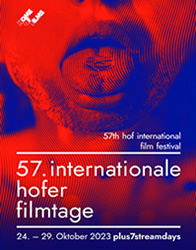German films stronger than ever before
Also in 2000, there was talk of an upward trend in the German program, thanks to films like LIEBESLUDER (A BUNDLE OF JOY), ALASKA.DE and DIE INNERE SICHERHEIT (THE STATE I AM IN).
The trend continued in 2001. According to the FAZ:
“You leave Hof with the feeling that you’ve been well entertained, five days in a row.”
Not least of all thanks to Christian Petzold’s TOTER MANN (SOMETHING TO REMIND ME) with Hoferian Sven Pippig in one of the leading roles for which he received the Grimme Award two years later. Pippig also was part of the festival’s workforce and ten years later would be mourned; at the time of his death he was a mere fifty years old.
The title of another production proved quite programmatic for the crisis-ridden German film: Marc Rothemund’s DIE HOFFNUNG STIRBT ZULETZT (HOPE DIES LAST). Quite so. Suddenly German cinema hit the international headlines. Not only did the abstinence at major festivals come to an end, German films even started winning prizes – including an Oscar®. So it was no coincidence that in 2003 the festival dedicated the retrospective to a German filmmaker which so far had been reserved mainly for US Americans, Canadians, the British, Australians, New Zealanders and Japanese. However, Ulli Lommel, who began his career as an actor with Fassbinder, left for America early on and there met and worked with Andy Warhol. His low-budget horror film THE BOOGEYMAN was a sensational success. In Hof, he presented himself as a man with just one passion: filmmaking. This held true for the whole program, which evidenced top-class charm.
The 2004 edition once again invited audiences on an exciting discovery trip. KAMMERFLIMMERN (OFF BEAT) and NAPOLA, ALLEIN (ALONE) and EGOSHOOTER were met with a lively response. And once again the festival – which boasted record attendance – proved to be a forum for current German productions which for five days, “as long as Hof is on”, knew no crisis, as the FAZ wrote. FAZ film editor Michael Althen continued, “If Heinz Badewitz hadn’t created the Hof Film Festival, only those who were around in the good old days of FC Bayern Hof would know anything about this ‘strangely faceless little town somewhere in the middle of Europe.'”
Michael Althen died in 2011 aged 48, one year after Schlingensief, who had passed away with 49. The actor Sven Pippig died, as noted, with 50, and when Heinz Badewitz opened the 49th festival in 2015, he had to mourn the deaths of Peter Kern (aged 66) and Jimi Vogler (aged 68). At the time, nobody could foresee the disaster – Badewitz’s own death – that would befall the festival less than six months later.
The first film screened at the festival in 2005 was the oldest in the program: Z from 1969, made by Costa-Gavras, the doyen of political thrillers, who arrived from Paris to present the retrospective dedicated to him. The German film was represented with two dozen movies, among others Andreas Dresen‘s SOMMER VORM BALKON (SUMMER IN BERLIN). The recipient of the Award of the City of Hof was Christoph Schlingensief who said that the festival had been “the absolute starting point” for him. For the first time ever, Hypo-Vereinsbank, FilmFernsehFonds (FFF) Bayern and Bavaria Film jointly offered the newly-founded German Cinema New Talent Award.


